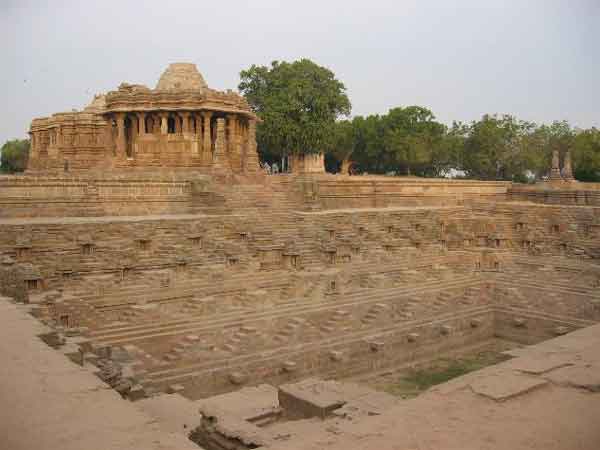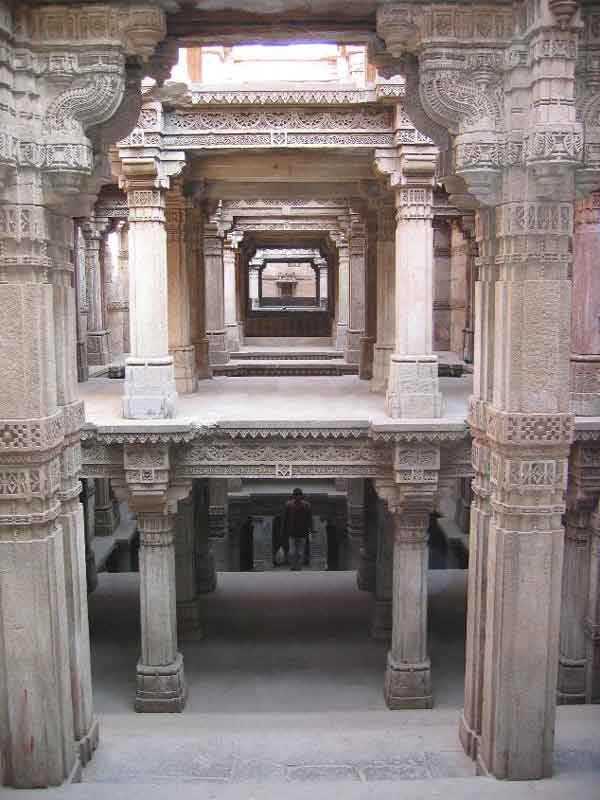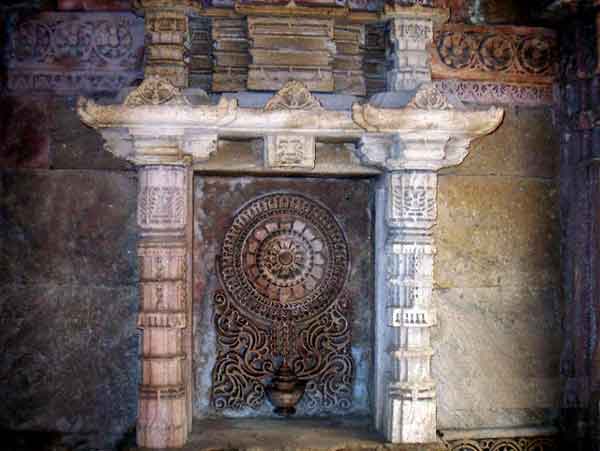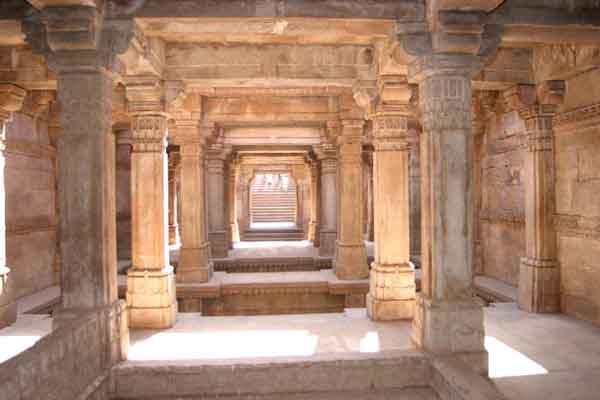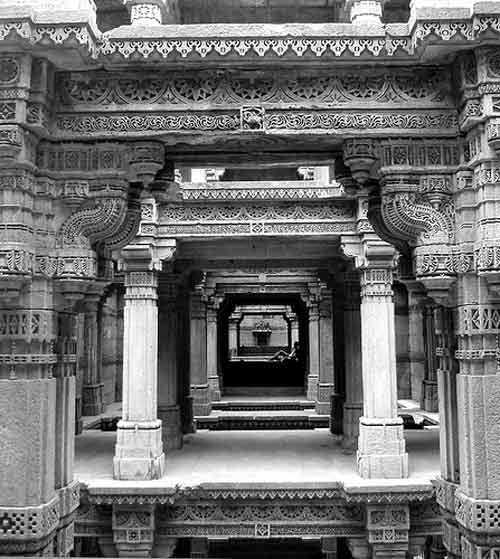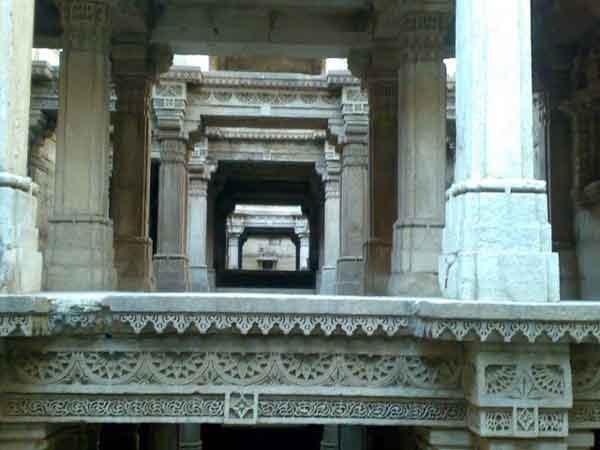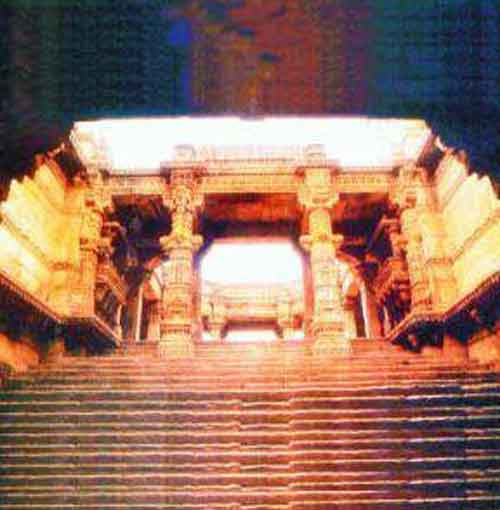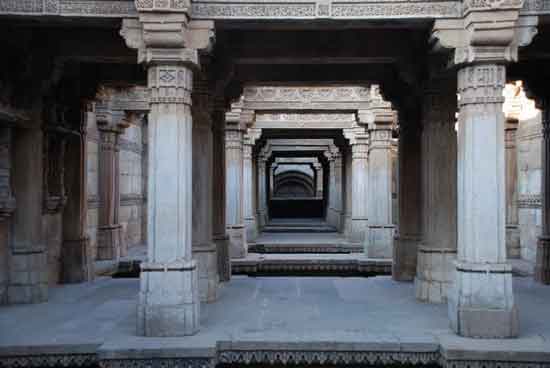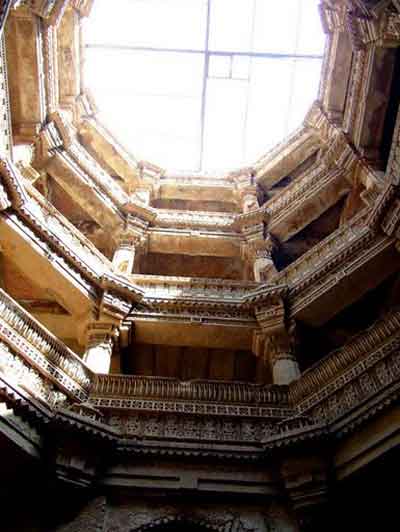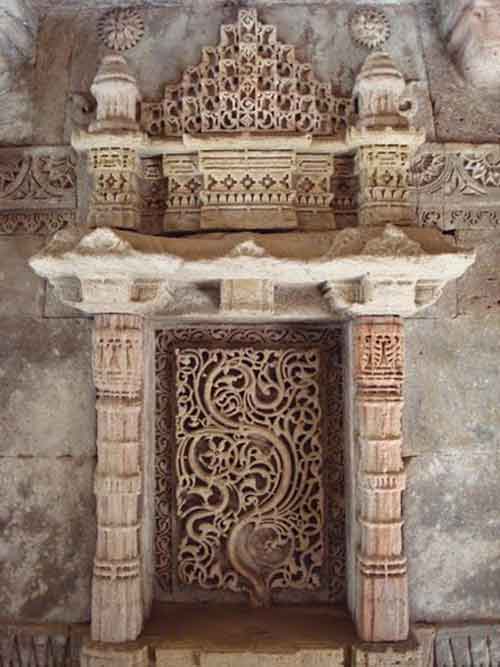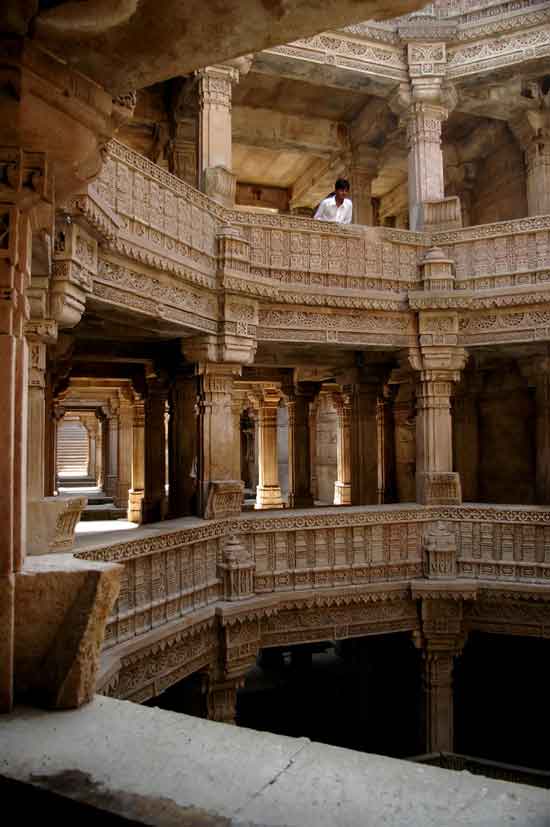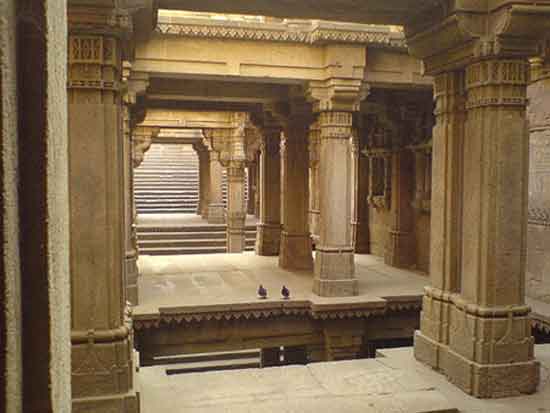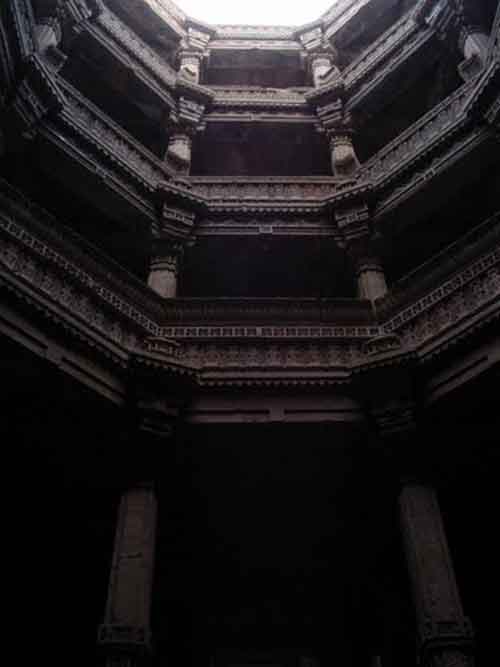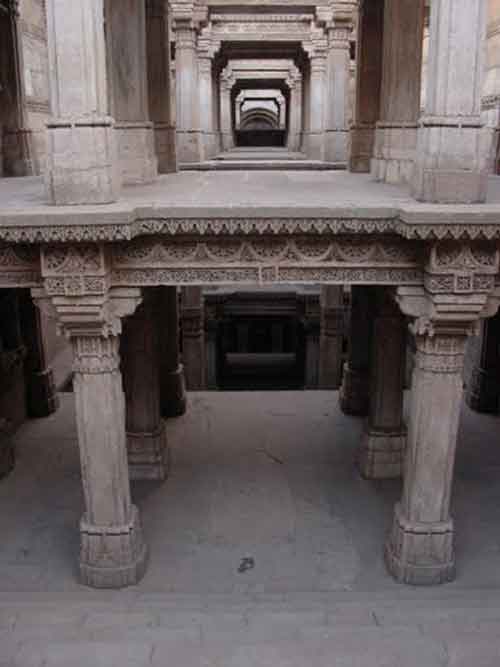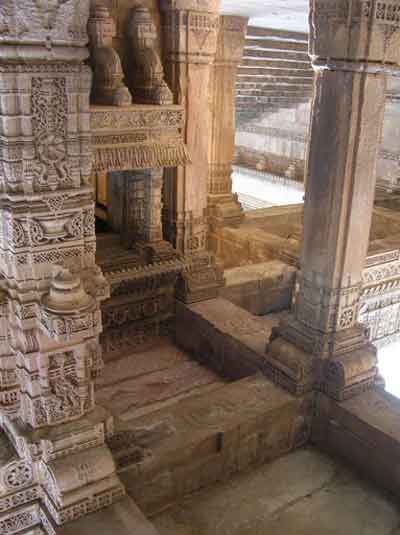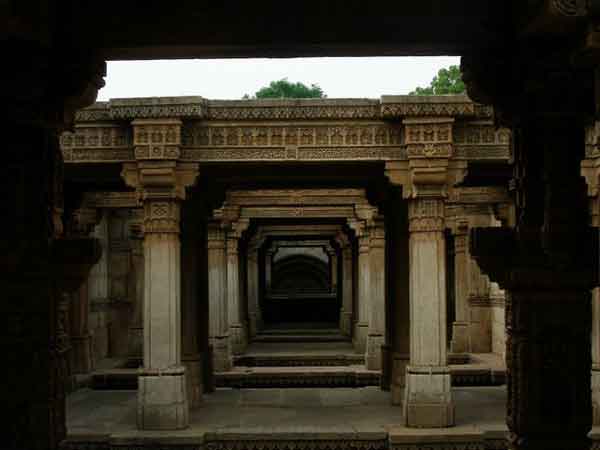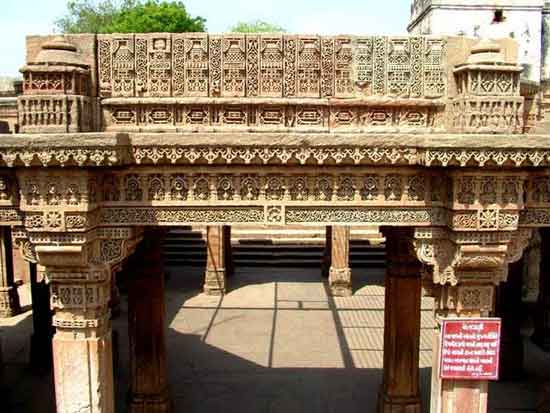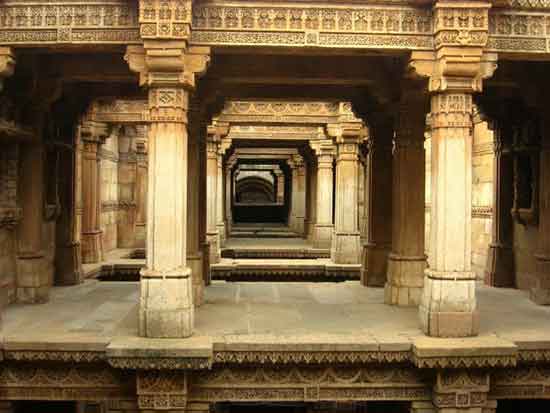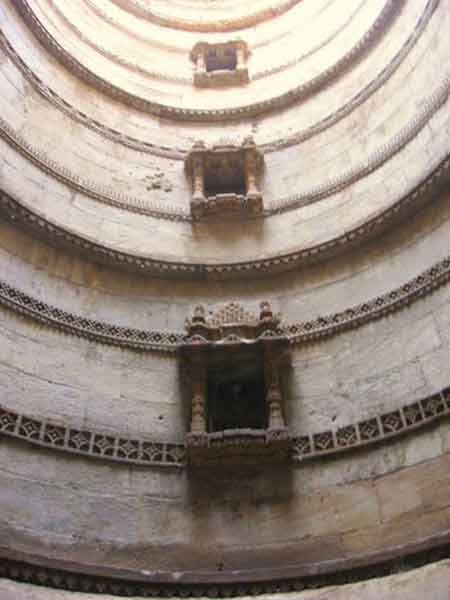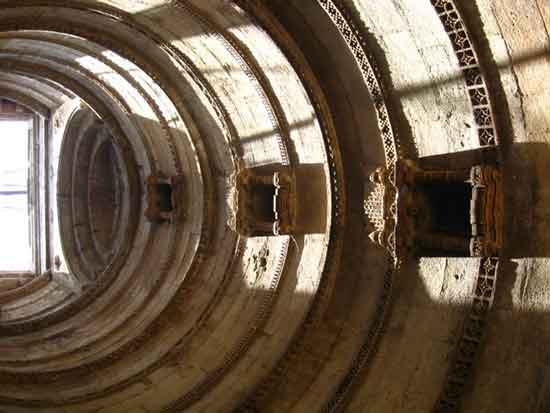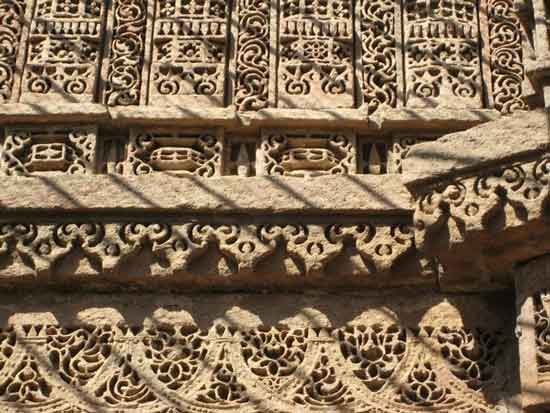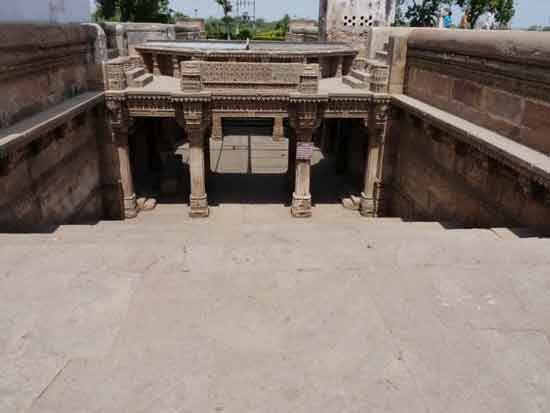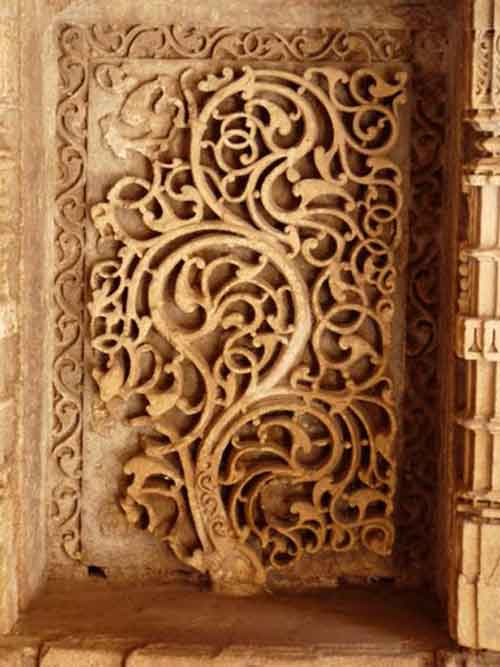Adalaj Vav
Monday, 05 October 2009 12:21
Adalaj Vav |
About: |
| Adalaj Vav is a five-storied step-well located in a small sleepy village named Adalaj, about 15 km from Gandhinagar city. Adalaj Vav was built in 1499.There are about 120 vavs or step-wells spread across the Indian state of Gujarat. The oldest vav is the Rani vav or Queen's vav, which is located in Patan and dates back to the 11th century AD. However, the vav situated in the small village of Adlaj is the most popular one. The Adlaj vav is in fact a na vav, literally meaning an upside down architecture of a step-well.
Built entirely of sandstone, one can enter into this step-well from three sides, which consist of octagonal landings with huge carved colonnades and intricately carved niches. The architecture of this well also shows the influence of the earlier Solanki rulers of Gujarat. Carvings of leafy creepers-typical adornment of Islamic architecture-co-exist with Hindu symbolism. Among the other carvings on the panels are a king sitting on a stool with two bearers, a scene depicting women churning buttermilk, musicians accompanying dancing women apart from abstract representations of various Hindu Gods and Goddesses. One can also see a few Buddhist and Jain influences on some of the pillars and walls. This stupendous structure with its elaborate and heavily ornamented temple-like finish and surrounding structures is a synthesis of various elements-earth, rock and water. On one story is a little Hindu shrine secretly hidden in an obscure corner. The step-well served both ritualistic as well as utilitarian needs. People from the nearby villages used to take water from the well and considered it holy. In the semi arid climate of Gujarat, the cool water from the vav provided a welcome break, particularly in the harsh summer months. Water from the vav was also used for irrigation. Openings in the ceilings above the landing enable light and air to enter the well. However, direct sunlight never reaches the flight of steps or landings except for a brief period at noon as the inner ceilings are arranged to receive the sunlight through these openings. According to a research, there was a total difference of six degrees between the outside and inside of the well, thus making it a veritable air-conditioner. Innumerable strong and exquisitely carved pillars support each story of the vav and each available stone surface is profusely covered with carvings. Each landing has wide space suggesting that people, especially travelers, rested there while on journey. The main attraction of this step-well is the pool of water at the lowest level. Besides this, there is a niche here that houses an ami khumb or a pot that contains the water of life and a kalpa vriksha or a tree of life made out of a single stone slab. These sites attract the villagers on religious and auspicious occasions like marriages, sacred thread ceremonies (a ritual performed by Hindus) etc. In the vicinity of the well are graves of the six masons who were instrumental in erecting it. It is believed when Mohammed Begda asked them if another vav was possible, they replied in the affirmative. This proved to be their undoing and they were instantly put to death. Perhaps that is why the Adlaj step-well stands unrivalled till today. |
Location info: |
| Address:Adalaj Vav,Ahmedabad,Gujrat,India |
| District: Ahmedabad |
| Nearest City: Gandhinagar |
| Language: Gujarati, Hindi. |
| Best time to visit: Nvember to April |
Climate/Weather: |
| Summer temperature ranges between the 23°C to 43°C.,Witner temperature ranges from 15°C to 35°C |
History: |
|
Adalaj’s Adalaj Vav is a step well which was constructed by Queen Rudabai. The Vav or the step-well in Adalaj gets its name from the lady patron, Ruda, who was the wife of the Vaghela chief, Virsinh. Adalaj Vav has an inscription written in Sanskrit, which depicts the entire history to its visitors with accurate dates. The legend behind the origin of this step-well is as interesting as its architecture and is shrouded in beauty, romance and tragedy. In AD 1499, the area around Adlaj was known as Dandai Desh and was ruled by Rana Veer Singh of the Vaghela dynasty. Around this time, Mohammed Begda, a Muslim ruler of a neighboring state attacked Dandai Desh and killed Rana Veer Singh. The beauty of the slain king's widow, Rani Roopba, enamored Mohammed Begda who sent her a proposal of marriage. The heartbroken but determined queen agreed to the proposal on the condition that he complete a five-storied step-well (vav) for her. The Muslim ruler, enticed by the charm of the queen, readily agreed. |
Interesting things to do: |
Interesting things to Visit: |
| Sarkhej: Sarkhej is situated about 8 kms. southwest of the city centre and a suburb of Ahmedabad. Sarkhej was once a country retreat of the Muslim rulers. It is known for its Rauza, the fine architectural complex of mosques, palaces, pavilions and tombs, all grouped around a stepped tank. The style shows distinct Hindu influence. By the entrance is the tomb of Sultan Mahmud Begadaa, with geometric jalis casting patterns of light on the floor. Shaikh Ahmed Khattu lived at Sarkhej and built this mosque with a great open space in front of the prayer hall, surrounded by the domes. The Dutch established an indigo factory nearby. Vishala: Vishala is situated about 5 kms. from Ahmedabad. It is purposefully built showpiece of a collection of huts along clay paths which capture the spirit of a traditional Gujarati village. It began as an excellent vegetarian restaurant in 1978 but has grown since to include a museum, live performances of music, dance and puppet shows as well as craftsman at work and an excellent shop. Pots, handloom linens, hand crafted shoes, clothes, brassware or embroidery from Vishala. Here you can sit cross-legged at low tables, eat on green leaves and drink from clay tumblers. The portions are generous and there is a large variety of traditional dishes, breads, chutneys, ending with an Indian sweet and nutty ice-cream. Utensils Museum: Adalaj: Dada Hari Vav: Gujarat Science City: Nalsarovar Bird Sanctuary: Jama Masjid: Sidi Bashir's Mosque: Kankaria Lake: City Museum: Dada Hari Vav: Mata Bhavani’s Well: Hathee Singh Temple: Swami Narayan Temple: |
Mobile range info: |
How to reach? |
| Nearest Railway Station:Ahmedabad at(19km), railway station |
| Nearest Airport:Ahmedabad at(19km),airport |
| Road Transport:Baroda (Vadodara) 113 km, Mt. Abu 228 km, Udaipur 252 km, Jaipur 657 km, Bombay 545 km, Delhi 1076 km, Gandhinagar 25 km, Modhera 110 km, Nal Sarovar 71 km and Lothal 80 km. |
Nearest Visiting places: |
| Akshardham: Akshardham is a unique cultural complex built in Gandhinagar in memory of Lord Swaminarayan. Inspired by H. D. Pramukh Swami Maharaj, Akshardham is a miracle worked by the service and devotion of thousands of volunteers. It is an intricately carved, majestic monument of 6000 tons of pink sand stone. The entire monument was built without the use of steel. Besides a 7 feet gold leafed idol of Lord Swaminarayan and his holy relics, there are three exhibitions on Indian Culture with light and sound shows, a multimedia show and an animatronic show. Games, rides and food refreshments are other attractions of Akshardham. Lakshmi Vilas Palace: Maharaja Fateh Singh Museum: Gandhi Ashram: Sarita Udyan: Hanumanji Temple: Ishwariya Temple: Lothal: Takhteshwar Temple: Gandhi Smriti Museum: |
Nearest Petrol Pump: |
|
Petrol Pump:Sector 11,gandhinagar,Gujarat,India IBP Petrol Pump:Gandhinagar,Gujarat,India |
Hotels/Lodge/Accommodation: |
| Hotel Vice President:C G Road,Narrangpura,Ahmedabad,Gujarat,Inidia,Ph:079 26575005
The Metropole Hotel:Subhash Bridge,Ahmedabad,Gujarat,India,Ph:079 3013 0200 |
Things to carry: |
Tips & Suggestions: |
Help Line/Phone Number: |
| Police Station: |
| Nearest Hospital: sterling hospital:Ahmedabad,Gujarat,India Rajasthan hospital:Ahmedabad,Gujarat,India |
| Society/Community Phone Number |
| Links:www.ahmedabad.org.uk |
Video Gallery
Dynamic View
Nearest Attraction
|
|
| Jumma Masjid |
| Jumma Masjid of Ahmedabad is one of the most beautiful mosques in India. It was built in the year 1423 by the founder of the city, Sultan Ahmed Shah, and is located in the old city. Built in yellow sandstone, this monument is capable of outshining any other monument of Ahmedabad. Jama Masjid is a fine example of Indo Saracenic architecture, with the special touch of the Sultan himself. It presents an extraordinary blend of Hindu and Muslim styles of architecture.The historians refer to it as the most beautiful mosque of the east. It is an imposing structure in the center of the old city and rests on 260 pillars, supporting fifteen domes....more |
| Siddi Sayed's Mosque |
| The Sidi Saiyad Mosque is a renowned ancient mosque in Ahmedabad, built by Ahmed Shah slave Sidi Saiyad in 1571. Situated near the famous Lal Darwaja at Bhadra, it was once part of the city wall of Ahmedabad. The most interesting features of the mosque are the fabulous Jhali screens lining its upper walls and the magnificent and exclusive stone tracery. The screens are framed in ten semi-circular windows and are built in Indo-Saracenic style of architecture. The carved stone windows depict the complex intertwining of the branches of the kalpa tree....more |
| Sarangpur Hanumanji Temple |
| Hanumanji Maharaj at Sarangpur, is famed around the world for expelling spirits and Ghosts from people plagued with such problems. This was due to the blessing of Gopalanand Swami to Vagha Khachar, who invoked Hanumanji with his wand, to be ever present in the idol to drive out such evils. The kind Swami helped Vagha Khachar with such blessing as he readily served saints and devotees offering them hospitality. As a result his income had dwindled. Swami therefore decided to help him by installing the idol of Hanuman, which provided a strong source of income, which facilitated him to continue to render service to saints and devotees....more |
| Manav Mandir temple |
| Manav Mandir is a lotus shaped, pink temple erected by the Ashirvad society and is located at Cinema Road. It is also known as Kamal Mandir. The presiding deity of the temple is Mataji also known as Ambaji - the source of Shakti-Spiritual energy. Darshan is open to visitors from morning 6.00am to 12.30 noon and from 3.00pm to 9.30pm. The Arti timings are 7.00am and 7.00pm. During the Navaratri festival (September-October) special prayer programmes and yagna are performed.Manav Mandir is one of the famous temples in the district. It is a lotus-shaped, pink temple erected by the Ashirvad society. Dedicated to Mataji, the source of power or spiritual energy, the temple attracts more than 10,000 devotees a year. The temple is also famous as Kamal Mandir. A wide range of pujas are arranged in the temple.....more |
| Bhadra Fort and Teen Darwaza |
| One of the most beautiful monuments in Ahmedabad is the Bhadra Fort and Teen Darwaza, Ahmedabad. Situated in Ahmedabad this is one of the most beautiful forts in the city which attracts tourists from all over. Indianholiday.com offers online information on Bhadra Fort and Teen Darwaza, Ahmedabad and other tourist attractions of Gujarat and other parts of India.When it comes to monuments in Ahmedabad, Bhadra fort is one name that indeed deserves a special mention. Constructed in the year 1411 A.D. during the rule of Marathas, it was established by Sultan Ahmad Shah, the founder of Ahmedabad city. Bhadra fort in Ahmedabad is a royal fort that occupies the top most position in the Ahmedabad sightseeing tour. Read on to know more about Bhadra fort in Ahmedabad, India....more
|
| Mata Bhavani Well |
| Mata Bhavani Well is a step well located just 200 m north of Dada Hari Wav in Ahmedabad, Gujarat. Built in 11th century, this long well with the ends projecting east and west is noted for its fine carvings. It has an entrance on the east side. The staircase goes down to the east and at the east end, there is a circular shaft. The well was built in the form of stairs as the water level changes depending on seasons.Mata Bhavani Well, Ahmedabad is one of the important tourist attractions of Ahmedabad. The Mata Bhavani Well, Ahmedabad is one of the longest wells that ends projecting towards and east and west. On the eastern side there is an entrance. The staircase to the Mata Bhavani Well, Ahmedabad descends to the east end and there is a circular shaft. In the earlier times, water in the shaft was brought up by the cows and used for irrigation.....more |
| Tomb of Ahmed Shah |
| The tombs of Ahmed Shah and his queens are located outside of the east gate of the Jama Masjid to the south west of Bhadra Fort in Ahmedabad, Gujarat.It was constructed in 1442 after the death of Ahmed Shah, the founder of the city.Women are prohibited to visit the central chamber of the mosque. The tombs of the queens are situated on a raised platform across the street.The Tomb of Ahmed Shah Ahmedabad is one of the most important tourist attractions of Ahmedabad. The tomb is square shaped with latticed stone windows. The women are not allowed in the central chamber in the Tomb of Ahmed Shah Ahmedabad. Just across the main road is the Rani no Hajiro where you can get to see the tombs of Ahmed Shah queens. Though the Tomb of Ahmed Shah, Ahmedabad is in quite good shape yet the tombs of Ahmed Shah wives are not in quite good shape.....more |
| Sabasrmati Ashram |
| Sabarmati Ashram is situated on the banks of River Sabarmati. It was founded in the year 1917 AD and is also known as Gandhi Ashram or the Harijan Ashram. The ashram once served as the residence of the Father of the Nation. It is from this place that Gandhiji spearheaded the Dandi March, on 12th March 1930.The March was an important event in the freedom struggle of India. It was aimed at revolting against the salt laws imposed by the British Government. The ashram faces the prison on one side and the river on the other.Sabarmati Ashram, formerly known as Satyagraha Ashram, situated in Ahmedabad at the Kocharab Bungalow of Jivanlal Desai a barrister. Later on it was shifted to the banks of Sabarmati river and then it came to be known as Sabarmati Ashram. Gandhi stayed at the Ashram from 1915 to 1933 later on the Ashram was disbanded. The Ashram is a witness to many important historical events....more |
| Shaking Minarets |
| The Shaking Minarets, Ahmedabad or the Jhulta Minar is one of the most unique monuments in Ahmedabad. Located in Siddi Bashir Mosque near the Sarangpur gate this is one of the beautiful tourist places in the city. Indianholiday.com offers online information on Shaking Minarets Ahmedabad and other tourist attractions of Gujarat and other parts of India.The Shaking Minarets, Ahmedabad is one of the most interesting tourist attractions of Ahmedabad which you can see on your tour to Gujarat. Each of the minarets is 3 storeyed tall and they have intricate designs carved on them with stone balconies that are around 21.34 meters high. If any one of the minarets is shaken then the other minaret even vibrates. However the most surprising fact about the Shaking Minarets in Ahmedabad in India is their connecting passage which remains free of any kind of vibration. From intricate designs to the exquisite artwork the Shaking Minarets, Ahmedabad are one of the major tourist attractions in Gujrat.....more |
| Dada Hari Wav |
| Dada Hari Vav is an octagonal shaped well, which is located below the ground level. This underground well has been intricately carved in the typical Gujarati designs. Made from fine stone work of Gujarat, the well has been drawing more and more tourists year after year. While designing this stepped well, adequate attention was paid to its each and every detail. This is indicative from the fact that, right from pillars to walls to steps, everything has been beautifully decorated. The visiting hours of the well are from 09:00 am to 05:00 pm.The Dada Hari Vav, Ahmedabad is a uniquely designed octagonal shaped step well in Ahmedabad. The interiors and the underground of the Dada Hari Vav, Ahmedabad has been intricately designed. Each year tourists from all over are allured to visit this unique step well which is one of the major tourist attractions of Gujarat....more |
| Rani ki Vav |
| Rani Ki Vav is the oldest and the grandest stepwell in the state of Gujarat. It is situated at Patan and is believed to have been built during 1022 to 1063 AD. The construction was completed by the widowed queen Udayamati.She was the wife of King Bhimdev I son of Mularaja, the founder of the Solanki dynasty of Anahilwada Pattan.It is a richly sculptured monument and a major tourist spot in Patan. The size of the Rani Ki Vav is so huge that the tourists appear to be ants climbing an anthill.Due to silting, a major portion of the well has deteriorated. There were some renovation exercises in 1980, which have restored some of the ancient glory of the place. One of its pillars is so beautifully carved, that it reminds one of the ancient charm of the monument. It appears the well is made up of bricks. There is small gateway just below the last step of the Rani Ki Vav well. The gateway opens into a 30 km tunnel which leads to the nearby town of Siddhpur. This was used by the King to escape in the times of defeat.....more |
| Harappan Ruins |
| Lothal Harappan Ruins are by far the most important and significant tourist attractions of the place. One can take a stroll round the ancient dockyard, the bastion, the lower town, the bead factory and the storage houses. The advanced and modernized drainage system is something to marvel at. There is a museum right to the west that showcases a number of articles comprising of bronze and copper mirrors, painted potteries, miniature bullock carts used as toy items, jewelry, beads and a variety of objects made of stone, shell and bone. You can also take a close look at the seals from Bahrain, terracotta figures whose origin can be traced back to Sumeria and other objects from Egypt. Another interesting item on display is a model of the city made of plaster of Paris based on reconstructions made by archeologists....more |
| Shreyas Folk Museum |
| Sabarmati in the suburbs of Ambavadi is Shreyas Folk Art Museum. The Museum showcases the traditional folk art and crafts of Gujarat's numerous tribes. The museum is opened from 9 am to noon from 3-5 pm from Tuesday to Thursday.The museum exhibits the folk arts and crafts of Gujarat, particularly textile and clothing. Also on exhibit include a complete elephant skeleton (3.19 m high), coins, animal's caparisons, weapons, toys, costumes, masks, puppets and musical instruments.The city grew steadily outgrowing the space within the city walls, spreading further outward even to the other side of the river. Eventually, most of the walls were removed, and today only the gates still stand, as well as a short section of wall also stands along the riverfront.....more |
| Kite Museum |
| Kite Museum is at Paldi in Ahmedabad.January is the season for kites in Ahmedabad, as it is in the whole of Gujarat. During the festival of Makar Sankranti, which marks the end of winter solstice, the city skies become ablaze with colourful kites of all shapes and sizes. It is a little surprise then that Ahmedabad is home to a unique Kite Museum. A visit to this museum is an educative and entertaining experience for the children, one that will acquaint them with kites - how they are made and how they fly. Creative designs are bound to capture their imagination.Ahmedabad is in a hue of spectacular colours cutting across the blue skies as the International kite festival brings the most fantastic shades and designs. The kite festival is a cause for celebration across Gujrat. Friends, family and neighbourhood acquaintances are all out on the streets trying to outdo the other with some strategic moves to win and stay flying. And if the splendor of the day gets you all excited you should witness the beauty of the lit box kites in the nights....more |
| Lalbhai Dalpatbhai Museum |
| The Lalbhai Dalpatbhai Museum, Ahmedabad also known as the Institute of Indology has a strong collaboration with the National Mission from 2003. The list of manuscripts, books and miniature paintings gives the tourists an idea about the art and culture of ancient India. From painted patas, sculptures to bronze and woodwork, Lalbhai Dalpatbhai Museum, Ahmedabad is an educative and informative place for the tourists.The museum has a huge collection of miniature paintings, cloth paintings, stone sculptures, terracotta, bronzes, textiles, wood work, metal sculptures, coins and various paintings of Tagore and artwork of Nepal and Tibet. The museum has also a big library, which contains about 45000 books and 75, 000 manuscripts. The books are based on Jainism and Buddhism, tantra, grammar, and Indian philosophy. The books are written in different languages like Sanskrit, Pali, Prakrit, Old Gujarati, Apabhramsa, Hindi, and Rajasthan.....more |
| Archaeological Museum |
| Lothal a very ancient city lies about 87 kilometers from Ahmedabad,There was a full-fledged settlement in Lothal during the the Harappan era that dates back to the 2nd millennium BC. About 82 kilometers from Ahmedabad, you will get the opportunity to see the incredible sight of the world oldest urban cultures or Harappan culture in its fullest form.The museum was setup in 1976 in order to display the artifacts recovered from the excavation conducted from 1952 to 1961.The Museum has three galleries.In the front gallery depicts an artist conjectural idea of Harappan town of Lothal. There are also introductory write-ups and maps about the site. The gallery at left side has showcases with beads, terracotta ornaments, replicas of seal and sealings, shell and ivory objects, copper and bronze objects, tools and potteries yielded from excavations....more |
| City Museum |
| The City Museum, Ahmedabad is in the Sanskar Kendra building which is one of the finest museums in Ahmedabad. Located in the heart of the city, the building was built by the well known French architect Le Corbusier. The City Museum attracts tourists from all over. Indianholiday.com offers online information on City Museum, Ahmedabad and other tourist attractions of Gujarat and other parts of India.The tourists can also get a glimpse of ancient art, pottery, woodcraft and frescoes of medieval India in the City Museum, Ahmedabad. There are historical evidences of Industrial Revolution in Ahmedabad and the effects of Gandhism. Ahmedabad which was one of the most excellent textile producing regions was called the Manchester of India during that period. The City Museum, Ahmedabad also has remnants of that period stored in its precious memorabilia. Tourists can get a glimpse of exquisite designs on variety of textiles such as brocade, Chinese embroidery, carpets, tents, royal attire. There are some precious photographs as well as antique camera and other equipments....more |
| Calico Museum of Textiles |
| Calico Museum of Textiles is one of the finest museums to be set up in India. It was inaugurated in the year 1949 by the then Prime Minister of India, Jawahar Lal Nehru. The museum houses one of the rare collections of textiles, dating back to the 17th century. It is presently located in the Sarabhai Foundation, in the Shahibag premises. Calico museum is the world's best museum on textiles. Ahmedabad has been a major textile trade center sine the 15th century. This inspired Shri Sarabhai, his sister Gira Sarabhai and the great industrial house of Calico to establish India's unique museum on textiles in the city.The textiles on display include court textiles used by the Mughal and provincial rulers of 15th to 19th centuries. Also on display are regional embroideries of the 19th century, tie-dyed textiles and religious textiles. The galleries also have exhibits on ritual art and sculpture, temple hangings, miniature paintings, South Indian bronzes, Jain art and sculpture, and textile techniques galleries and a library. The museum has played an important role in determining the curriculum taught in the textile designing courses at the prestigious National Institute of Design also located in Ahmedabad....more |
| NC Mehta Gallery |
| N C Mehta Art Gallery is situated near the campus of Gujarat University in Gujarat. This art gallery houses an excellent collection of miniature paintings such as Pahadi miniatures and the famous Chaurpanchashika series.In all the Indian Museums the N.C.Mehta Collection of Gujarat Museum Society is very unique as It contains important collection of Pahadi Miniatures & the famous Chaurpanchashika Series, Chaurpanchasika Series is displayed at N.C.Mehta gallery only across the worldThe Gujarat Museum Society The main objective of the society are to preserve the invaluable collection of paintings, inculcate art appreciation and to promote its study and research. Indian miniatures include illustrations of sacred and secular works, poetic compositions, epics Ragamala paintings, Darbar scenes, portraits and social scenes....more |
| Nal Sarovar Bird Sanctuary |
| A black tailed godwit gracefully descends upon the tranquil water, flutters its wings and sails on. A small, brown and white wader with a slightly up curved bill, the bird has traveled 3500 kms from its nesting ground in Central Europe to spend the winter at Nalsarovar in Gujarat.Clouds upon clouds of more than 200 types of birds land in this lake having made an equally long journey to escape the harsh winter of their nesting areas. Here they find food and warmth. These migrant birds visit Nalsarovar every year from November to February. During these four months water is plentiful and fish, insects and aquatic plants abound in the lake an ideal environment for the birds. Nalsarovar at this time is a birdwatcher's delight....more |
| Law garden |
| Law Garden is a public garden in the city of Ahmedabad, India. The market outside the garden is very famous for the handicraft goods sold by local people. The road at the side of the garden is filled with street hawkers selling all kinds of food items.The Law Garden eatery market would be regularized. The standing committee has asked the municipal commissioner to get the design and policy prepared. The regularization will help generate employment and will help the civic body to keep a close watch on the quality of food served there.The most popular hub in the city of Ahmedabad is the Law Garden. This public garden is situated in the centre of the town of Ahmedabad.The familiar Law Garden is well known for purchasing the handcrafts and traditional Gujarati dresses from local vendors. Visiting this public garden will make you to rejoice and make a good pass time here....more |
| Sabrmati River |
| The Sabarmati River originates from the ranges of Arravalli in the Udaipur district of Rajasthan, Western India. The river is about 371 km in length. In its initial course, the river is also called as Wakal. The river empties into the Gulf of Cambay of Arabian Sea. The river traverses a stretch of about 400 Km. The Banas basin lies to the east of the river, while the Mahi Basin lie to its north, and the Luni Basin to its west. The southern boundary of the river flows along the border of the Gujarat State. The total area of the Basin is 4,164 km square.The course of River Sabarmati extends for almost 371 km in western India. The Sabarmati River starts its journey in the Aravalli Range of the Udaipur District of Rajasthan....more |
| Sarkhej Fair |
| A visit to Tourism of Gujarat offers information about the land of color and gaiety that Gujarat is situated in India. Tourism of Gujarat, offers information about the Sarkhej fair which is an annual event held in Gujaratin India. Sarkhej Fair, being held every year in Gujarat, India, witnesses a conglomeration of a large number of people from various parts of the state of Gujarat, situated in India.Tourism of Gujarat, takes a tourist on an odyssey across the confines of Gujarat, situated in India with the Sarkhej fair, being one of the most popular and the most significant Muslim fair in the region. Sarkhej Fair is held in the southern outskirts of the city of Ahmedabad, located in Gujarat, India....more |
| Tribal Museum |
| ....more |
